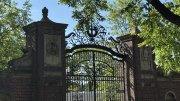Research universities are the world’s great venture capitalists for investments in human capital—that is, knowledge. Harvard enrolls thousands of students, each of whom is a “project.” Students acquire human capital, an asset that they turn to account as scientists, composers, financiers, politicians. Harvard also supports thousands of studies, each of which is also a “project”—an analysis of Bach’s compositions, an investigation of poor families’ expenditures, the mapping of the human genome. Like venture capitalists, research universities have the expertise to recognize projects with huge potential—the ablest students, the best experiments. Like venture capitalists, they not only fund projects but guide them and match them with specialized resources. Like venture capitalists, they retain an “equity share” in their projects—though they do this in a special way.
My analogy may sound crass, but Harvard is invaluable in its venture-capitalist role. Governments will never be as farsighted or enterprising when funding research or education. Banks lack the expertise to select great students and researchers and won’t invest in knowledge that benefits the world at large.
Moreover, since universities do not actually retain equity shares in their alumni or most fruits of their research, they must raise students and develop friends who want to give back. Universities can do this only by inspiring a deep sense of common purpose, working for the public good, and committing themselves to a selfless quest for truth for its own sake.
What does this tell us about Harvard in 2036?
Harvard must husband the key source of its advantage—the expertise within its community. So that its great minds can devote their scarce time to solving problems, exchanging ideas, and interacting deeply with students, the University must—by 2036—become an efficient manager that streamlines all except these crucial tasks. It should harness technology to eliminate the grunt work in scholarship.
Harvard’s expertise and resources will be useless without great students and researchers in whom to invest. To recruit the world’s best, it must offer a superb curriculum and environment for scholarly interaction—these must remain the core function of the University. The quest for the best projects will take the Harvard of 2036 across international and disciplinary boundaries—no longer as a conscious gesture of openness but simply because it will be most productive.
Harvard’s investment strategy should align with its special role. Its risk-taking should consider that the University could lose expertise in a downturn and never get it back. Yet Harvard must also make the most audacious human-capital investments, those that require its distinctive expertise and long horizon. It should partner with the private sector and government but focus its role on crucial elements—for instance, basic science—that others won’t support.
Finally, Harvard must remember that it pulls off the marvelous feat of persuading donors to support investments from which they gain no direct benefit because it is truly devoted to knowledge, the nurturing of reflective human beings and public leaders (not just future donors), and solving society’s problems. Because this feat depends on community and shared values, the University should be, above all, a locus of meaningful interactions. A visitor in 2036 should still find students meeting with professors, debating ideas in seminars, huddling with great texts, and planning the future of the world over dinner.
Caroline Hoxby ’88, RI ’97, is the Bommer professor in economics at Stanford. Formerly Freed professor of economics at Harvard, she studies the economics and history of higher education; her forthcoming Clarendon Lectures in Economics lay out a model of research universities’ role in the world.









